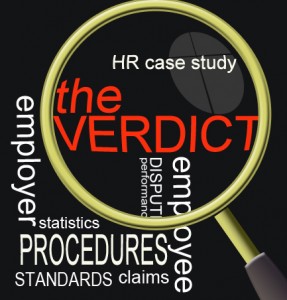 Ever wonder if you should “friend” your co-workers and supervisors on Facebook? Read this case to see how one woman who did was eventually terminated for a discrepancy between her Family and Medical Leave Act (FMLA) leave and her Facebook activity.
Ever wonder if you should “friend” your co-workers and supervisors on Facebook? Read this case to see how one woman who did was eventually terminated for a discrepancy between her Family and Medical Leave Act (FMLA) leave and her Facebook activity.
Sara Jaszczyszyn v. Advantage Health Physician Network, Case No. 11-1697
In January 2008, Jaszczyszyn accepted a part-time position at Advantage Health Physician Network (Advantage). Prior to Advantage’s offer, Jaszczyszyn passed a health examination and was cleared to work. During the exam, however, she revealed that she had injured her back in a car accident 10 years prior. Though she had undergone two surgeries for the injury, Jaszczyszyn reported that she had no recent pain or problems.
It wasn’t until a year and a half after she had been hired, after Jaszczyszyn had been promoted to a full-time position as a customer service representative, that she began experiencing flare-ups of pain in her lower back. In August 2009, Jaszczyszyn requested her doctor reevaluate her condition. Several scans and images indicated “mild degenerative changes in the lower lumbar spine.” Her doctor’s office completed a Work Release Form deeming Jaszczyszyn “completely incapacitated” from August 31st through September 7th. Though this form was not received until September 3rd by Advantage HR Representative, Shovein, Jaszczyszyn’s leave was granted and it was advised that she request FMLA leave to protect her job.
Jaszczyszyn returned to work on September 8th, and on September 9th she submitted a Certification form from her doctor that stated, “Patient is having about 4 flare up’s [sic] a month; [t]he flare up could last anywhere from a few hours or days; and when they occur, [s]he may need to sit, lie down or change positions when flare up happen [sic].” It continued, “only when she has a flare up she will need to be off.” After Jaszczyszyn submitted the mentioned Certification form, she never returned to work, but sent a Work Release Form on September 22nd stating from her doctor that she was completely incapacitated from September 10th through October 5th. Eight days later, the doctor’s office submitted an additional Work Release Form, which declared Jaszczyszyn completely incapacitated from October 5th through October 26th.
On October 3rd, however, during a time when she was believed to be “completely incapacitated,” Jaszczyszyn attended a local Polish festival. Pictures from the festival were posted on Jaszczyszyn’s Facebook page and seemed to contradict the voice message she had left for her supervisor before the festival, stating that she had had a flare up and would not be at work on Monday. Perhaps because of her involvement in the festival, Jaszczyszyn must have forgotten that she was Facebook friends with many of her co-workers, including her supervisor. After looking over the pictures, Jaszczyszyn’s supervisor contacted the Department Director and met to discuss the situation. It was later determined that due to Jaszczyszyn’s chronic absenteeism, she would receive a notice of termination.
Upon her termination, Jaszczyszyn argued that no one had told her she was not allowed to attend the festival. When asked to then explain the inconsistency between her “complete incapacitation” and her activity in the photos, she did not respond and was silent, but did suggest that she was not showing the pain she was in in the pictures.
Employer’s Bottom Line
Based on these answers, Jaszczyszyn’s director and supervisors, gave her a Corrective Action Notice—terminating her. Following this, Jaszczyszyn sued Advantage, “alleging that she was terminated in retaliation for exercising her rights pursuant to the FMLA or to interfere with her exercise of those rights and asserting just two claims: an FMLA interference claim and an FMLA retaliation claim.” The court ruled that no evidence supported either of these claims and ruled in favor of Advantage. Jaszczyszyn appealed this ruling, only to have the Sixth Circuit affirm the earlier ruling.
HR Advocate Joan Canning offers training solutions including Manager Compliance training with ongoing HR Advocate Help Desk guidance on the proper and improper review of an employee’s social media postings.
